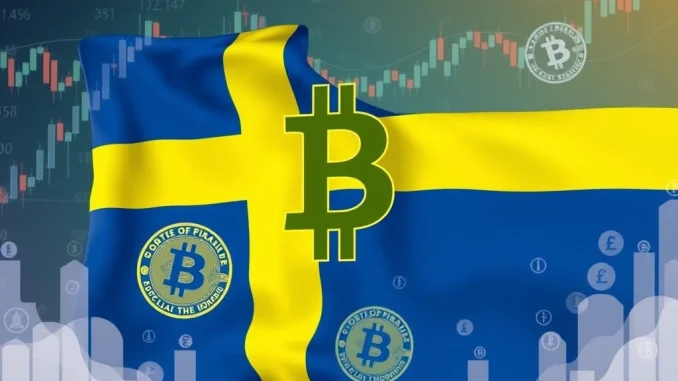
Is Sweden on the verge of a groundbreaking shift in its financial strategy? A Swedish lawmaker has ignited a fascinating debate by formally questioning whether the government should incorporate Bitcoin into its national foreign exchange reserves. This move could signal a significant step towards mainstream cryptocurrency adoption, but what are the implications?
Why is Sweden Considering Bitcoin for its Reserves?
Rickard Nordin, a Swedish Member of Parliament, has officially requested Finance Minister Elisabeth Svantesson to explore the possibility of adding Bitcoin (BTC) to Sweden’s foreign exchange reserves. This isn’t a casual inquiry; it’s a formal call to action, urging the government to seriously evaluate the potential benefits and risks associated with integrating cryptocurrency into the nation’s financial framework.
Nordin’s request highlights several key factors driving this consideration:
- Global Trends: Other nations and even corporations are increasingly exploring and adopting Bitcoin as a reserve asset. Nordin points to these international movements as a crucial context for Sweden’s own deliberations.
- U.S. Policy Developments: Recent policy shifts in the United States regarding cryptocurrency regulation and acceptance are also cited as influential factors. What happens in major economies like the U.S. often sets a precedent for global financial trends.
- Risk and Opportunity Assessment: The core of Nordin’s argument is the need for a balanced evaluation. He stresses that the government must thoroughly assess both the potential risks and the considerable opportunities that Bitcoin adoption could present for Sweden.
What are Foreign Exchange Reserves and Why Does it Matter?
Foreign exchange reserves are essentially a country’s savings account in foreign currencies and other reserve assets like gold or Special Drawing Rights (SDRs). Governments hold these reserves for various crucial reasons:
- Stabilizing National Currency: Reserves can be used to intervene in foreign exchange markets to stabilize the value of the national currency.
- Meeting International Obligations: They ensure a country can meet its international financial obligations and payments.
- Maintaining Confidence: Healthy reserves bolster investor confidence in a nation’s economy.
- Emergency Funds: They act as a financial buffer during economic crises or emergencies.
Traditionally, these reserves are held in stable, government-backed assets. The question now is: could Bitcoin, a decentralized digital asset, become a legitimate part of this mix?
The Potential Benefits of Adding Bitcoin to Sweden’s Reserves
Integrating Bitcoin into foreign exchange reserves is not a decision to be taken lightly. However, the potential advantages are compelling and warrant serious consideration:
- Diversification: Bitcoin is a unique asset class with low correlation to traditional markets. Adding it to reserves could enhance diversification and potentially reduce overall risk.
- Inflation Hedge: Some argue that Bitcoin acts as a hedge against inflation due to its limited supply. In an era of potential inflationary pressures, this could be an attractive attribute for a reserve asset.
- Technological Innovation: Embracing Bitcoin could position Sweden as a forward-thinking, technologically advanced nation, attracting investment and talent in the burgeoning digital economy.
- Decentralization and Security: Bitcoin’s decentralized nature means it is not controlled by any single entity, reducing reliance on traditional financial institutions and potentially enhancing security against geopolitical risks.
Navigating the Challenges and Risks of Bitcoin Reserves
While the benefits are enticing, the path to including Bitcoin in government adoption of foreign exchange reserves is fraught with challenges. These risks must be meticulously addressed:
- Volatility: Bitcoin’s price volatility is a major concern for a reserve asset that is expected to maintain stability. Significant price swings could impact the value of reserves.
- Regulatory Uncertainty: The regulatory landscape for cryptocurrency is still evolving globally. Lack of clear regulations could pose risks and complexities.
- Security and Custody: Securely storing and managing Bitcoin reserves requires specialized infrastructure and expertise to prevent theft or loss.
- Market Maturity: Compared to traditional reserve assets, the Bitcoin market is still relatively young and less mature. Liquidity and market depth might be concerns.
- Public Perception and Political Will: Public and political acceptance of Bitcoin as a legitimate reserve asset may require significant education and persuasion.
Examples of Bitcoin Adoption and Global Trends
Sweden wouldn’t be venturing into uncharted territory. Several examples illustrate the growing global interest in Bitcoin and cryptocurrency as reserve assets or within national economies:
| Country/Entity | Action | Details |
|---|---|---|
| El Salvador | Bitcoin as Legal Tender | Adopted Bitcoin as legal tender alongside the US dollar. Holds Bitcoin in its treasury. |
| Central African Republic | Bitcoin as Legal Tender | Followed El Salvador in making Bitcoin legal tender. |
| MicroStrategy | Corporate Treasury Reserve | Publicly traded company that holds a significant amount of Bitcoin as part of its treasury reserve strategy. |
| Tether (USDT) | Reserve Asset | Stablecoin issuer that has disclosed holding Bitcoin as part of its reserves backing USDT. |
These examples, although diverse, showcase a growing trend of considering Bitcoin beyond just a speculative asset.
Actionable Insights: What Could Sweden Do Next?
For Sweden to move forward responsibly, several key steps could be taken:
- Comprehensive Risk Assessment: Conduct a thorough and independent risk assessment specifically tailored to Bitcoin as a reserve asset, considering all potential vulnerabilities and mitigation strategies.
- Stakeholder Consultation: Engage in broad consultations with financial experts, cryptocurrency specialists, and international organizations to gather diverse perspectives and insights.
- Pilot Program: Consider a pilot program with a small allocation of Bitcoin to reserves to gain practical experience and assess real-world performance before making a large-scale commitment.
- Regulatory Framework: Develop a clear and robust regulatory framework for cryptocurrency assets to provide legal certainty and protect against illicit activities.
- Public Education: Initiate public education campaigns to inform citizens about cryptocurrency and the rationale behind considering Bitcoin for reserves, fostering transparency and understanding.
Conclusion: A Bold Step or a Risky Gamble?
The question posed by the Swedish lawmaker is more than just a policy inquiry; it’s a reflection of the evolving global financial landscape. Whether Sweden will ultimately decide to add Bitcoin to its foreign exchange reserves remains to be seen. However, the very fact that this question is being formally asked at a governmental level signifies a major shift in perception towards cryptocurrency. By carefully weighing the opportunities against the challenges, and learning from global trends, Sweden has the potential to make a strategic and potentially revolutionary move that could position it at the forefront of financial innovation. The world will be watching closely to see if Sweden takes this bold step into the future of finance.



